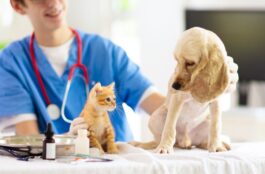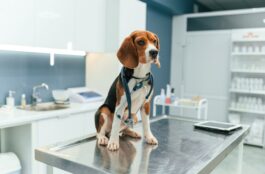
We all love our pets and consider them a part of the family. Just like humans, pets need regular medical check-ups to ensure they stay in tip-top shape. Routine exams are more than just a way to keep track of vaccinations; they are vital for spotting early signs of health issues, keeping them happy, and ensuring a long life. Let’s explore why routine exams are so vital for your pet’s health.
1. Early Detection of Health Issues
One of the main reasons routine exams are essential is early detection. Pets are masters at hiding discomfort and pain. During these exams, your vet can pick up on any subtle signs of illness that might go unnoticed by even the most observant pet parents.
Why Early Detection Matters
-
Prevents progression of illnesses
-
Reduces the cost of treatment
-
Increases the chances of a full recovery
2. Vaccinations and Preventative Care
During routine exams, your vet will usually update vaccinations, providing crucial preventative care against diseases. Vaccines are vital in safeguarding your pet’s health against a myriad of serious conditions.
The Importance of Vaccinations
-
Protect against diseases like rabies, distemper, and parvovirus
-
Help you stay compliant with local laws and regulations
-
Create safer environments for both your pet and others
3. Monitoring Overall Health
Routine exams give vets the opportunity to monitor your pet’s overall health. From checking their weight and dental health to observing their coat and skin quality, these check-ups ensure that all aspects of your pet’s health are in balance.
What Vets Look For
-
Weight fluctuations
-
Changes in appetite or behavior
-
Skin and coat condition
-
Dental health
4. Nutritional Guidance
Nutrition is a critical part of your pet’s overall health. During routine exams, your vet can provide personalized nutritional advice tailored to your pet’s needs, age, weight, and health status.
Benefits of Nutritional Counseling
-
It helps maintain a healthy weight
-
Prevents obesity-related diseases
-
Supports overall well-being
5. Behavioral Assessment
Your vet can also offer valuable insights into your pet’s behavior. If your pet is showing signs of anxiety, aggression, or other behavioral issues, routine exams are a great opportunity to discuss these concerns and find solutions.
Common Behavioral Concerns
-
Separation anxiety
-
Excessive barking or meowing
-
Destructive behaviors
6. Control
Insects such as fleas, ticks, and various parasites can wreak havoc on your pet’s health. Routine exams include checks for these pests and provide preventative treatments to keep them at bay.
Common Parasites Monitored
-
Fleas and ticks
-
Heartworms
-
Intestinal worms
7. Accessing Advanced Medical Services
Routine exams also serve as a gateway to more advanced medical services. If issues are identified, your primary vet may refer you to specialists for more targeted treatment options, such as veterinary internal medicine experts who can provide specialized care.
8. Age-Specific Care
As pets age, their medical needs change. Routine exams are particularly important for senior pets who may require specialized care. These exams can help monitor age-related issues such as arthritis, kidney disease, and other geriatric conditions.
Senior Pet Health Checks
-
Regular blood work
-
Monitoring for chronic conditions
-
Assessing mobility and joint health
9. Customized Vaccination Plans
If you live in specific areas like the South, routine exams will ensure that you get location-specific health advice. For example, dog & cat vaccinations in Rainbow City, AL, may differ from those required in other geographical areas due to varying disease prevalence.
10. Dental Care
Routine exams often include dental check-ups, which are vital for maintaining your pet’s oral health. Poor dental hygiene can lead to a range of issues, from bad breath to serious infections.
Importance of Dental Care
-
Prevents periodontal disease
-
Reduces risk of tooth loss
-
It helps maintain overall health by preventing oral bacteria from entering the bloodstream
11. Lab Tests and Diagnostics
Disease detection often goes hand-in-hand with lab tests. Your vet may recommend additional diagnostics to get to the root of any health concerns. Modern facilities, such as the veterinary diagnostic laboratory in Rainbow City, AL, help in conducting these essential tests.
12. Ensuring Optimal Physical Fitness
Routine exams offer a chance to assess your pet’s physical fitness. Regular physical activity is crucial for maintaining a healthy weight and overall well-being.
Importance of Physical Fitness
-
Reduces the risk of obesity
-
Improves cardiovascular health
-
Enhances mental well-being by reducing anxiety and depression
13. Peace of Mind
Ultimately, routine exams bring peace of mind. Knowing that your pet is receiving comprehensive health care helps you rest easy, assured that you’ve done everything possible to ensure their well-being.
14. Building a Lifelong Relationship with Your Vet
Establishing a strong relationship with your vet can be incredibly beneficial for your pet’s health. Regular visits ensure that your vet knows your pet’s medical history thoroughly, enabling more personalized and efficient care.
Benefits of a Strong Vet-Pet Relationship
-
Easier diagnosis and treatment of health issues
-
Tailored healthcare plans
-
Enhanced trust and comfort for your pet
Final Thoughts
Routine exams are far more than a mere formality. They are a proactive approach to your pet’s health, offering early detection of potential issues, preventative care, and peace of mind. By scheduling regular visits to the vet, you play an active role in guaranteeing your pet’s long, healthy, and joyful life.


